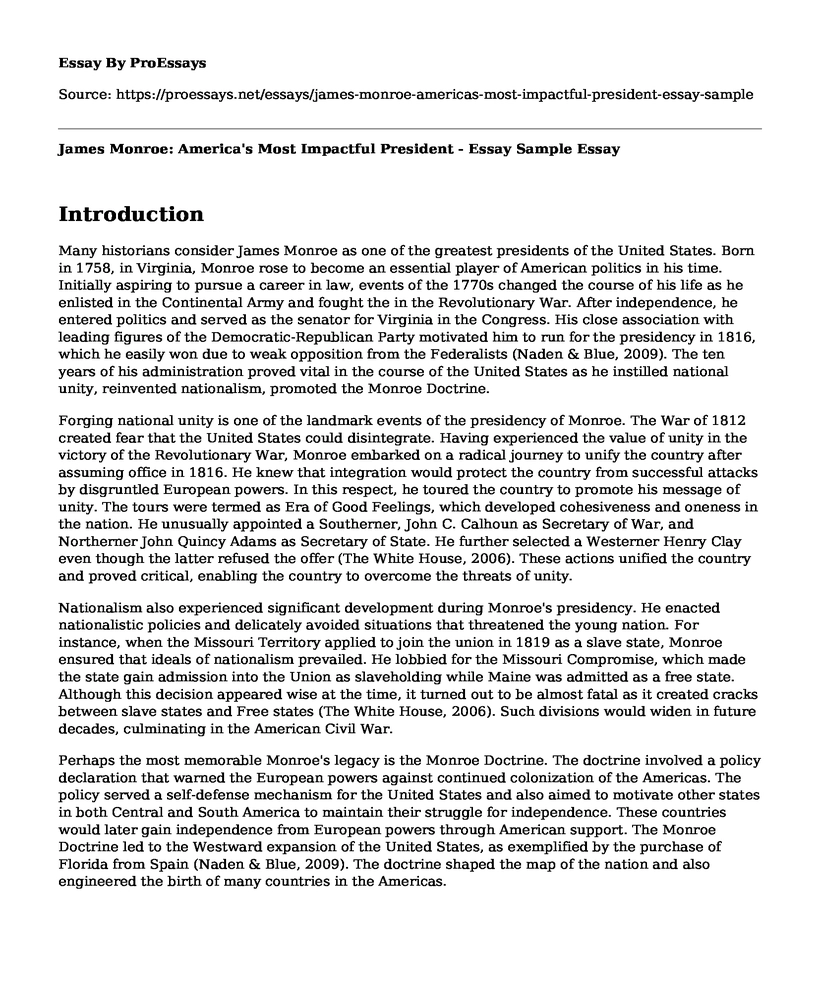Introduction
Many historians consider James Monroe as one of the greatest presidents of the United States. Born in 1758, in Virginia, Monroe rose to become an essential player of American politics in his time. Initially aspiring to pursue a career in law, events of the 1770s changed the course of his life as he enlisted in the Continental Army and fought the in the Revolutionary War. After independence, he entered politics and served as the senator for Virginia in the Congress. His close association with leading figures of the Democratic-Republican Party motivated him to run for the presidency in 1816, which he easily won due to weak opposition from the Federalists (Naden & Blue, 2009). The ten years of his administration proved vital in the course of the United States as he instilled national unity, reinvented nationalism, promoted the Monroe Doctrine.
Forging national unity is one of the landmark events of the presidency of Monroe. The War of 1812 created fear that the United States could disintegrate. Having experienced the value of unity in the victory of the Revolutionary War, Monroe embarked on a radical journey to unify the country after assuming office in 1816. He knew that integration would protect the country from successful attacks by disgruntled European powers. In this respect, he toured the country to promote his message of unity. The tours were termed as Era of Good Feelings, which developed cohesiveness and oneness in the nation. He unusually appointed a Southerner, John C. Calhoun as Secretary of War, and Northerner John Quincy Adams as Secretary of State. He further selected a Westerner Henry Clay even though the latter refused the offer (The White House, 2006). These actions unified the country and proved critical, enabling the country to overcome the threats of unity.
Nationalism also experienced significant development during Monroe's presidency. He enacted nationalistic policies and delicately avoided situations that threatened the young nation. For instance, when the Missouri Territory applied to join the union in 1819 as a slave state, Monroe ensured that ideals of nationalism prevailed. He lobbied for the Missouri Compromise, which made the state gain admission into the Union as slaveholding while Maine was admitted as a free state. Although this decision appeared wise at the time, it turned out to be almost fatal as it created cracks between slave states and Free states (The White House, 2006). Such divisions would widen in future decades, culminating in the American Civil War.
Perhaps the most memorable Monroe's legacy is the Monroe Doctrine. The doctrine involved a policy declaration that warned the European powers against continued colonization of the Americas. The policy served a self-defense mechanism for the United States and also aimed to motivate other states in both Central and South America to maintain their struggle for independence. These countries would later gain independence from European powers through American support. The Monroe Doctrine led to the Westward expansion of the United States, as exemplified by the purchase of Florida from Spain (Naden & Blue, 2009). The doctrine shaped the map of the nation and also engineered the birth of many countries in the Americas.
Conclusion
In conclusion, the presidency of Monroe defined the future of America and its neighbors in varied ways. The call for unity immediately he took office ensured that the fragile nation remained united. His quest for nationalism created divisions between slaveholding states and non-slaveholding states, especially after the admission of Missouri into the union. These cracks would cause the Civil War. Moreover, the Monroe doctrine enabled other American regions to gain independence and also led to the Westward expansion of the Union.
References
Naden, C. J., & Blue, R. (2009). James Monroe. Marshall Cavendish.
The White House. (2006). James Monroe. https://www.whitehouse.gov/about-the-white-house/presidents/james-monroe/
Cite this page
James Monroe: America's Most Impactful President - Essay Sample. (2023, May 04). Retrieved from https://proessays.net/essays/james-monroe-americas-most-impactful-president-essay-sample
If you are the original author of this essay and no longer wish to have it published on the ProEssays website, please click below to request its removal:
- Article Review Example. Reconstruction: America's Unfinished Revolution, 1863-1877
- The Civil War in Shepherdstown - Research Paper
- Locke's Liberalism and Burke's Conservatism Essay
- Essay Example on Comparing Corporate Bonds to Government Bonds: Risks & Rewards
- Essay Example on Michelle Obama: A Symbol of Hope and Realistic Change
- Free Research Paper Sample on Funding for Health Department
- Civil War Diseases - Essay Sample







